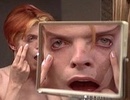Psychosis as a defence against emotional sensitivity/pain
Moderators: kiore, Blip, The_Metatron
•
3 posts
• Page 1 of 1
Psychosis as a defence against emotional sensitivity/pain
Much as some people far along the autistic spectrum sometimes flee deep into their condition as a defence/displacement from emotional realism/sensitivity/pain/trauma perhaps the same is true of those prone to psychosis? Although autism is generally thought to be an immutable/constant/permanent condition unlike psychosis AFAIK...interesting?
Dinosaurs = atheism
-

Keep It Real - Banned User
- THREAD STARTER
- Posts: 9341
- Age: 42
Re: Psychosis as a defence against emotional sensitivity/pain
"One of the great tragedies of mankind is that morality has been hijacked by religion." - Arthur C Clarke
"'Science doesn't know everything' - Well science knows it doesn't know everything, otherwise it'd stop" - Dara O'Brian
"'Science doesn't know everything' - Well science knows it doesn't know everything, otherwise it'd stop" - Dara O'Brian
-

Sendraks - Name: D-Money Jr
- Posts: 15260
- Age: 107

- Country: England
Re: Psychosis as a defence against emotional sensitivity/pain
Keep It Real wrote:Much as some people far along the autistic spectrum sometimes flee deep into their condition as a defence/displacement from emotional realism/sensitivity/pain/trauma perhaps the same is true of those prone to psychosis? Although autism is generally thought to be an immutable/constant/permanent condition unlike psychosis AFAIK...interesting?
Two different things. In the case of Autism, shutting down is disconnecting from reality where psychosis is a distortion of it.
This is a very good description of shutting down here:
https://everydayaspie.wordpress.com/2017/02/05/574/
Not at all like psychosis.
"Walla Walla Bonga!" — Witticism
-

felltoearth - Posts: 14762
- Age: 56

3 posts
• Page 1 of 1
Return to Psychology & Neuroscience
Who is online
Users viewing this topic: No registered users and 1 guest